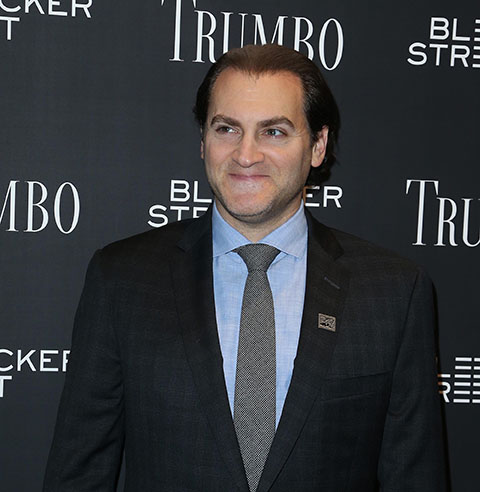Classy Trumbo Explores the Depths

Michael Stuhlbarg, who plays Edward G. Robinson in Trumbo, poses for photos on Nov. 3, 2015 at a special screening of the film held at MoMA in New York City. (Jimi Celeste/Patrick McMullan/Sipa USA/TNS)
Jay Roach’s adaptation of Bruce Cook’s Trumbo is a classy throwback to ‘50s period filmmaking with a slight touch of modernity and an exceptionally well knit, albeit tonally inconsistent, biopic of its title figure, Dalton Trumbo.
Roach, who is known for his famous comedies like Meet the Parents and Austin Powers, somewhat deviates by giving us an entirely new look at a topic that can be seen as a cross between grim and comical when dealing with all the confusion and absurdity that surrounded the Communist paranoia of the 1950s.
With Trumbo, Roach’s attention toward the subject’s controversial screenwriter can feel like a formulaic exercise when treading common grounds of free speech and the definition of the American way, but is nonetheless highly hoisted by a brilliant cast of characters and a solid direction from Roach.
Bryan Cranston (the Heisenberg you know him as) portrays a Dalton Trumbo that is full of finesse early on in the film while showing a deep, yet gradual decline of civility over the course of his journey from a disgraced and jailed A-list screenwriter working back up to the mantle of Hollywood’s greats.
Trumbo’s life is showcased as a rollercoaster of a trip through America’s age of the Hollywood blacklist, populated with various persons that make profound impressions on his goals for freedom of expression in the arts, political or not.
Former friends and allies in the industry like Edward G. Robinson (Michael Stuhlbarg), a prominent performer in the business who frequently worked with Trumbo, and other fellow writers like Arlen Hird (Louis C.K.) are played with almost as much gradual decline in love and trust as Cranston’s Trumbo in trying to support him in a time when free thought and ideas were tagged with Communist intent, making them all targets if merely associated with Dalton.
Trumbo’s family, particularly his wife Cleo (Diane Lane) and daughter Nikola (Elle Fanning), are so committed to him that they are practically hostages to his quest for redemption. Thus the story is partly a family conflict, trying to salvage the frailty of their reputation as an American family.
During his long trek back to cultural deference, Trumbo becomes a Ghost Writer as way of gaining back the spotlight by working for the King brothers (John Goodman and Stephen Root), a two man family operation that works to produce B-movies.
Another source of frustration during Trumbo’s period of struggle is Helen Mirren as sinuous and conniving renowned gossip columnist Hedda Hopper, who uses every opportunity in the media to thwart Dalton’s every move in rekindling his life and work.
With all the arduous obstacles in his path, Trumbo still preserves an immaculate persistence in overcoming a lifetime of spurns. Trumbo is another neat and colorful addition to top off the season, giving Cranston and company a potential place in this year’s contenders for the Oscars. 8.8/10.

